Archived Fire Damage Blog Posts
Fire Safety Tips for Every Room of the House
6/19/2022 (Permalink)
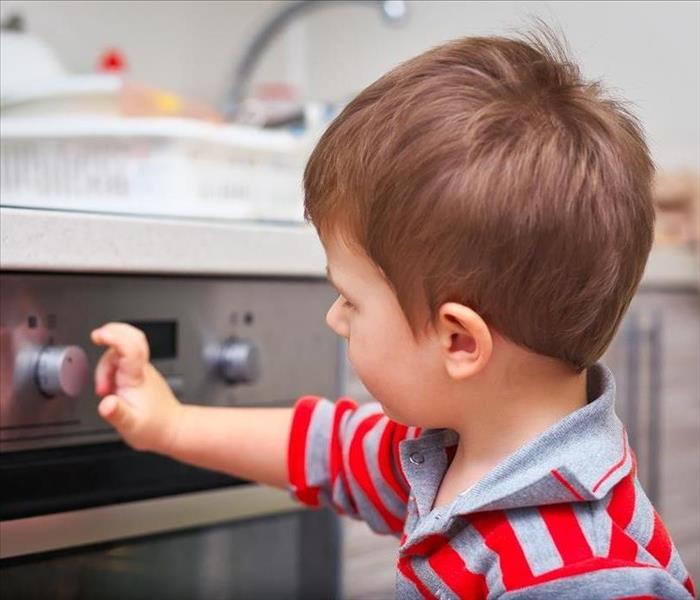 You can count on SERVPRO of Douglasville to help you recover after a house fire.
You can count on SERVPRO of Douglasville to help you recover after a house fire.
The unfortunate truth about household fires is that they can start for a myriad of reasons. From cooking incidents to improperly stored flammable items, many accidents can lead to a fire, which is why it is so vital to practice fire prevention throughout the house.
Making sure that you and every member of your household are aware of common fire hazards can help you all go about your lives with safety in mind, which drastically reduces the likelihood that you will wind up with a fire on your hands. Read on to learn about fire safety tips you should know for every room.
Kitchen Fire Safety Tips
Kitchens are the room in the home where a fire is most likely to break out, so it is extra important to be vigilant. Make sure there is nothing flammable near your stove or oven (including curtains, dish towels and potholders) and that food is never left unattended on the stove. It is also important to keep a fire extinguisher handy in case of any flare-ups, and ensure everyone in the home knows how to handle a grease fire as opposed to a regular fire.
Family Room Fire Safety Tips
While family rooms do not typically contain as many fire hazards as other areas of the home, there are still risks to consider. Don’t leave candles burning unattended, and if you have a fireplace, make sure it is inspected regularly by a certified professional. For electronics, be sure to not overload electrical outlets and replace cords and cables if they become frayed or worn out.
Garage and Storage Fire Safety Tips
Storage areas such as garages or basements can often become cluttered, which can lead to an excess of fire hazards. Make sure any flammable materials, such as lighter fluid or chemicals, are stored properly and are not able to get too hot in the summer months. Also be certain that these areas have clear and accessible exits free from clutter that could block someone’s path should they need to escape quickly.
*If you have damage to your home due to a house fire, you can count on us to help. Get in touch with us today to learn more about how our fire restoration services work.
Fire Safety Tips for the Whole Family
6/7/2022 (Permalink)
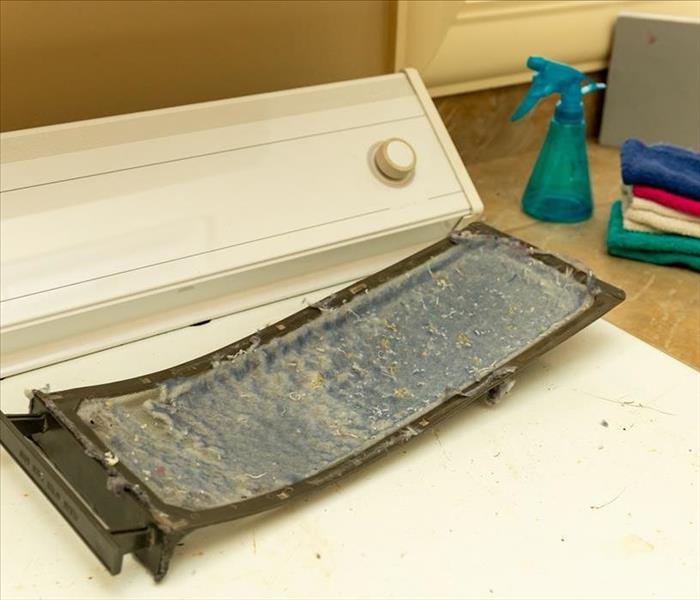 Take fire prevention steps seriously, let SERVPRO of Douglasville get you prepared.
Take fire prevention steps seriously, let SERVPRO of Douglasville get you prepared.
Fire safety is such an important thing for any household. House fires can be dangerous and traumatic, causing significant household damage and putting anyone in the vicinity directly in
harm’s way. Fortunately, fire safety is also a goal that the entire family can get involved with, keeping everyone more invested in safety and more prepared, just in case.
Many fire safety tips are things the entire family can participate in, which makes it a great family activity. Depending on who is in your household, it may be necessary to adjust some of these tips accordingly—for example, toddlers may have a great time drawing escape plans, while older kids may be more suited to smoke detector test duty.
However, we hope these general guidelines are helpful in getting everyone on the same page
for your home’s fire safety.
Fire Safety Tasks for Young Children
**Drawing an escape route.** Escaping quickly is key when it comes to a house fire, so an escape plan is a must. Young children can often be helpful here, drawing lines from each room
to indicate every exit.
**Being accountable for hazards.** Unattended candles, space heaters and cooking food can all be major fire hazards. Oftentimes, young children can make great safety accountability buddies,
calling out these hazards when they notice them.
Fire Safety Tasks for Older Children
**Checking smoke detectors.** Smoke detectors should be tested monthly, which can often be a great chore for preteens and teens in the home.
**Managing fire escape drills.** It is important to have a fire escape plan, and just as important to practice it regularly. Older children can be great at managing these drills, from planning them
out to debriefing as a family in order to see where there may be room for improvement.
**Cleaning out the dryer lint trap.** If your older children do their own laundry, it is important that they understand the importance of cleaning out the dryer lint trap. This is a commonly overlooked fire hazard, but the lint can heat up while the dryer is running and lead to a fire.
*If you have household damage due to a fire, we are here to help. Contact us today to learn more about our fire restoration options or get in touch 24/7 for a rapid response
Tips for Recovering After a House Fire
4/15/2022 (Permalink)
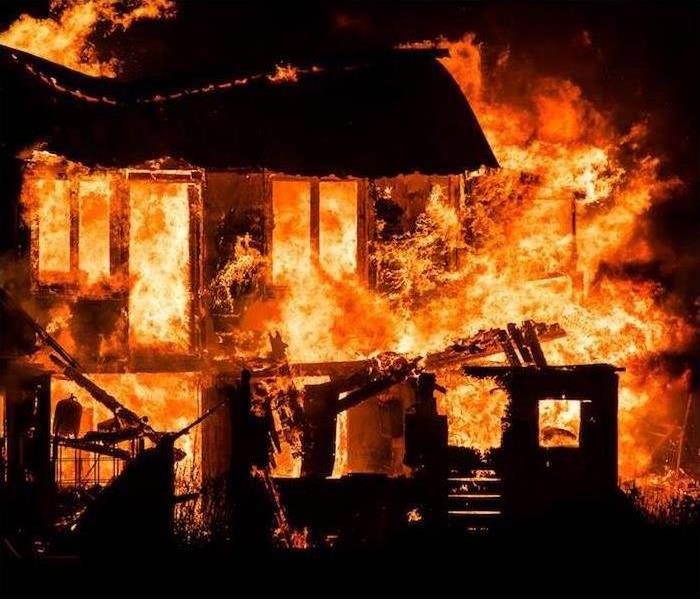 House fires trend to peak during the winter. SERVPRO of Douglasville is available 24/7 in the event of an emergency.
House fires trend to peak during the winter. SERVPRO of Douglasville is available 24/7 in the event of an emergency.
No one likes to think about suffering a loss like a house fire, but it’s a reality for millions of American families every year. House fires aren’t a seasonal risk to your home, but they do happen more frequently during the winter months.
If your family suffers a house fire, even one that does extensive damage, you can take steps to recover what you can from your home and recover emotionally, too. These tips can help you start the restoration process and help you deal with the aftermath of a house fire.
Taking the First Steps
The American Red Cross offers the following tips to help you in the immediate aftermath of a house fire.
After you’ve gotten everyone out of the house and treatment for any injured people or pets, then these are your next steps:
Let your loved ones know you’re safe. This is an important step, especially when news of a fire or issue can spread quickly.
Don’t go back into your home until it’s secured. The authorities will let you know when it’s safe to go back to your house. Please don’t go in there before because it can be unsafe.
Get in touch with your insurance company. You’ll want to let them know what happens to get the restoration process started.
Tips for Dealing With Emotions
It’s normal to feel a wide range of emotions after your home suffers a fire. They can range from grief to anger to depression. The American Psychological Association offers this advice to help you begin the process of recovering emotionally.
Find ways to reduce your stress. That can include exercise, meditation and deep breathing.
Don’t make major life decisions. It’s smart to avoid switching jobs or making other major choices while dealing with these complicated emotions.
Talk about your feelings. Whether you choose a therapist, family members or a close friend, it’s smart to talk to someone about what’s going on.
Don’t set expectations. There is no way you “should” be dealing with these issues. Instead, do what you can and be kind to yourself.
Take good care of yourself. Eat balanced meals and get plenty of sleep. It will help you better deal with a stressful situation.
If your home is damaged due to a fire or any other cause, you can always count on us for restoration assistance. We have crews who are available 24⁄7 in the event of an emergency. Contact us at any time to learn more about our restoration services and how we can help.
SERVPRO's Process for Fire Restoration
4/2/2022 (Permalink)
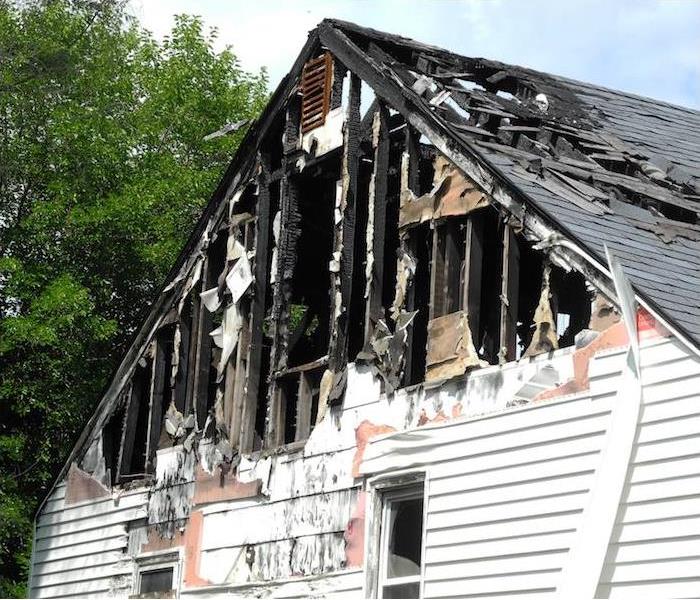 When your home or business endures fire damage, you can count on SERVPRO of Douglasville from start to finish.
When your home or business endures fire damage, you can count on SERVPRO of Douglasville from start to finish.
After a fire strikes your home or business, you’re left with damage from the fire as well as water saturating everything from the firefighting efforts. None of that would be a surprise to our experts here at SERVPRO, as we have the specialized fire restoration expertise to return your house to its pre-fire state.
Every fire damage situation is unique and necessitates a unique remedy, but the overall procedure remains the same. The following is how we will handle a “normal” fire damage situation.
Initial contact. We are on call 24 hours a day and seven days a week, including all holidays. Disaster doesn’t wait for office hours to strike, and we don’t wait to respond. When you contact us, the restoration procedure starts. Our experts will ask a number of questions about the fire damage so that we can get started immediately with the necessary equipment and resources.
Inspection. To establish the degree of the fire, water, smoke and soot damage, we will thoroughly check and test every room. By doing this, we are able to formulate the proper strategy. Fires can cause the air quality to be unsafe, so it’s important not to re-enter the property until experts have determined it is safe to do so.
Water removal. If there is water damage present as a result of firefighting efforts or sprinkler systems, we will begin the water removal procedure immediately to ensure the bulk of the water is removed. If there is any remaining water, it will be removed using dehumidifiers and fans, and the drying process will begin from there.
Cleaning. SERVPRO removes smoke and soot from ceilings, walls and other surfaces using highly specialized state-of-the-art equipment and processes. We’ll clean up all of the fire-damaged items and areas that can be cleaned and repaired. We will also work to return your possessions to their pre-fire state by applying a number of cleaning processes. We can clean and restore electronics, documents, upholstery and more. We also specialize in industrial air scrubbers and fogging equipment to eliminate odors.
Restoration. If during the cleaning process we determine that certain areas of your property cannot be cleaned, we also provide comprehensive restoration and rebuilding services. Restoration and rebuilding efforts include everything from modest repairs like drywall replacement, painting or carpet installation to substantial repairs like the complete rebuilding of different areas or rooms in your home or property.
When your home or business endures fire damage, you can trust that SERVPRO of Douglasville will be ready to be a helping hand and will get your home restored quickly and thoroughly to its pre-fire condition.
Keeping Track of Fire Safety at Your Business
3/30/2022 (Permalink)
 If you are dealing with the aftermath of a fire at your business, you can depend on SERVPRO of Douglasville.
If you are dealing with the aftermath of a fire at your business, you can depend on SERVPRO of Douglasville.
For business owners, there are few things more important for the safety of you and your staff than ensuring you have the right fire protections in place. Fires can be absolutely devastating for businesses, with over half never being able to recover after the damage—but fortunately, there are plenty of ways to decrease the likelihood that you will ever experience a fire at all.
All businesses are subjected to certain fire codes set forth by the National Fire Protection Association, which provide a great guideline for making sure you are being as safe as possible. In addition to adhering to fire codes when you are first starting out, it is also important to make sure you are regularly auditing your fire safety efforts to be sure nothing slips through the cracks. Below, we have listed out some helpful tips for doing just that.
Keeping Track of Your Fire Prevention Efforts in the Workplace
Make sure you have enough (working) fire extinguishers. It is required that all commercial spaces have fire extinguishers on the premises, though how many and where they are located will vary depending on your specific situation. That being said, it is important to check your fire extinguishers regularly—while they do have a long shelf life, there will be an indicator on each one that will let you know if it is time to be replaced.
Check or install commercial sprinkler systems. While not every business is required to have a sprinkler system, they can be a great investment for any commercial space. Sprinkler systems are extremely effective at stopping fires quickly, so even if your business is not technically required by codes to have them, it might be worth considering having a sprinkler of some sort put into place.
Be sure you are reviewing fire safety with your staff. Fire safety efforts are great, but if your staff is ill-prepared for a fire, they can be all for naught. Make sure you are regularly going over fire routes, fire exits, evacuation protocols and fire extinguisher use with your staff. That way, everyone will know exactly how to take action in the event that a fire begins, which can eliminate confusion in a panicking situation.
If you are dealing with the aftermath of a fire at your business, you can depend on us. Contact us today to learn more about our fire restoration services.
A Guide to Fire Code Considerations for Your Commercial Space
3/25/2022 (Permalink)
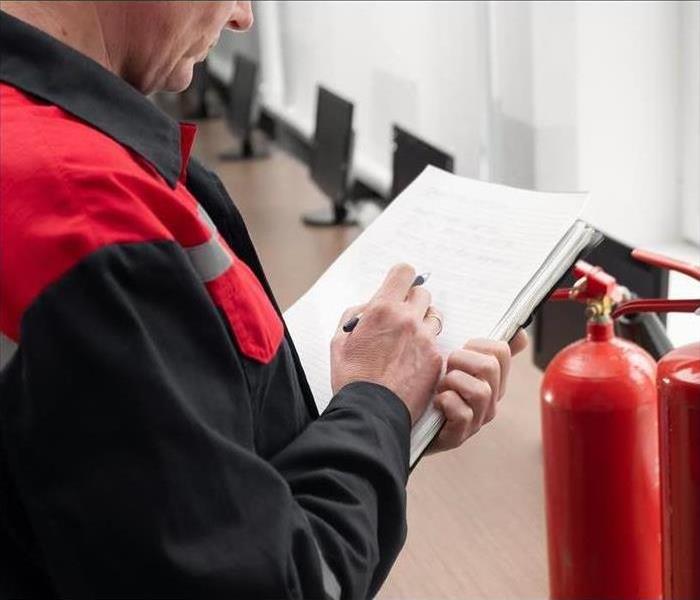 If your business needs help with fire damage, you can count on SERVPRO of Douglasville 24/7/365.
If your business needs help with fire damage, you can count on SERVPRO of Douglasville 24/7/365.
If you own or operate a business or other commercial space, understanding how to protect your investment and your employees from harm related to fire damage is a must. Not only are fires extremely dangerous for anyone who is in the area, but they can also be devastating to businesses—it is estimated that over half of businesses are unable to recover from a fire.
Fortunately, businesses are able to take many precautions when it comes to fire prevention, and national commercial fire codes are a great place to start. While each area will have their own local codes that should also be followed, below, we will examine some of the national codes that can help you keep your business safe and operational.
Fire Codes Pertaining to Commercial Sprinkler Systems
While they are not required in all types of commercial buildings, a commercial fire sprinkler system can be a fantastic way to reduce the risk of a fire severely impacting your business. Typically, the rules for fire sprinkler systems are that they must be installed in any commercial building over 5,000 square feet and any building that is taller than 55 feet in height.
Fire Codes Pertaining to Fire Alarms
While smaller commercial spaces are not always required to have a fire alarm system, installing them is a simple enough process that it is always a good idea. By alerting people to the fire quickly, your employees and customers will have more time to escape, which could potentially save a life. If possible, it is best to invest in interconnected fire alarms, so that when one is triggered, they will all sound to alert everyone in the area.
Fire Codes Pertaining to Fire Extinguishers
All businesses are required to have fire extinguishers on the premises, but how many and where they should be located varies based on the size and nature of the commercial space in question. Additionally, business owners are required to have fire extinguisher training with all employees at least once per year to be certain that everyone is aware of how to use a fire extinguisher and comfortable with the best practices.
If your business needs help with fire damage, you can count on us. We are here 24 hours a day to help you recover in the aftermath of a commercial fire. Contact us today to learn more.
Fire Safety & HVAC Maintenance
3/16/2022 (Permalink)
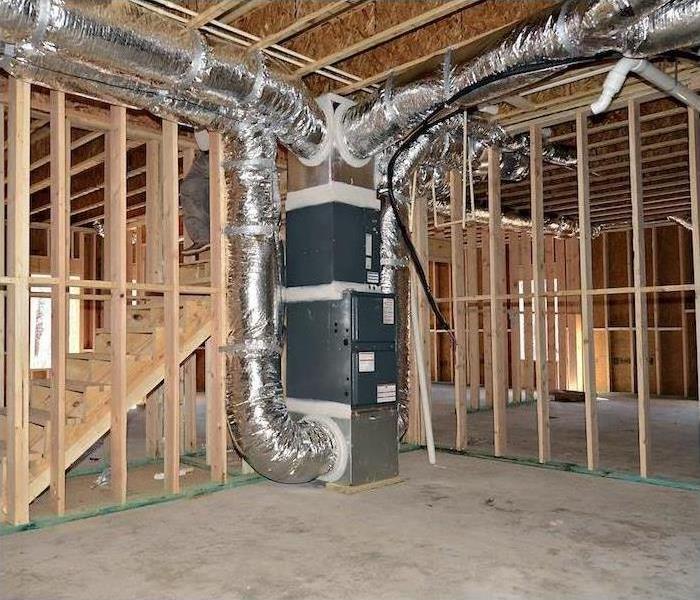 If fire should become a problem, contact the pros in green, SERVPRO of Douglasville.
If fire should become a problem, contact the pros in green, SERVPRO of Douglasville.
Being a responsible homeowner means taking care of the things that take care of you. Your HVAC system is always there, and there are few (if any) days per year in our area where you aren’t relying on it to keep your home comfortable. It often goes unappreciated—that is, until something goes south or stops working.
There are also some important fire safety concerns of which you need to remain aware, particularly as winter comes in and your HVAC switches to heating mode. Don’t let your source of comfort turn into a source of disaster.
Here’s what you need to do to make sure your HVAC system and furnace are running safely this fall and winter.
Routine Maintenance
Ideally, your HVAC system should be checked twice a year for any present or upcoming issues. A professional can see problems coming and head them off before any danger is presented.
Things like aging or fraying wiring can become fire hazards that are exacerbated by the extended use of HVAC systems during less pleasant times of the year.
Duct System Circulation
Overworked heating systems are dangerous heating systems, and one thing that can quickly cause your system to work too hard is allowing your ductwork to become or remain clogged. Poor circulation or ventilation can cause your furnace to overheat.
It’s recommended that you have your duct work cleaned every three to five years, and we can help with that.
Declutter Your Furnace Area
If your furnace is located in a designated area, or it’s in the corner of a basement or garage, make sure the two-foot radius around it is clear of clutter. Radiating heat (and certainly direct contact) from the furnace can cause flammable materials to ignite. Resist the urge to use your furnace area for storage.
Install Carbon Monoxide Detectors
If your furnace is gas-powered, carbon monoxide detectors can be as important for you as smoke alarms. The gas in your furnace is odorless, and you may not notice a leak until it’s too late. A detector can give you the assurance that things are running smoothly.
In addition to your regular fall maintenance, make sure to have your heating unit examined to give yourself a comfortable, fire-safe fall and winter season.
If fire should become a problem at home, we can help you with restoration and recovery. Contact SERVPRO to get the pros in green working for you right away.
Creating Your Home’s Fire Safety Blueprint
2/3/2022 (Permalink)
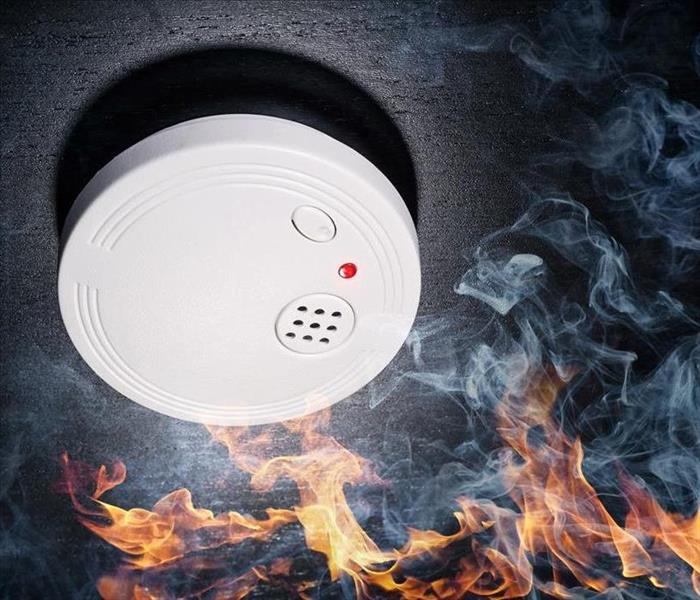 SERVPRO of Douglasville is here 24/7 to help you get prepared for an emergency.
SERVPRO of Douglasville is here 24/7 to help you get prepared for an emergency.
Increasing the fire safety of your home is a great goal. House fires can be traumatic and dangerous events, causing extensive property damage as well as injury or loss of life. However, if you have not previously considered your options for fire safety, getting into the habit of fire prevention around the house may seem like a daunting task.
The good news is that improving your home’s fire safety is ultimately quite a simple task. Once you assess where your gaps in fire prevention efforts are, you can implement simple new habits to better protect your home.
Below, we will help you identify where you could improve fire safety so you can figure out exactly what you can do to help keep your household safer from fires.
Determining Where to Improve Your Fire Safety at Home
**Consider personal safety first.** While fire prevention is quite important, the first thing you should do from a safety perspective is to consider how to protect your family if a fire does start. One of the best things you can do is install smoke alarms throughout the home and test them monthly to ensure they are operational. That way, anyone in the home will be alerted right away if a fire starts and can quickly get to safety. Additionally, you should draft a fire evacuation plan for your household and practice it regularly, so everyone is aware of what to do if the alarms do sound.
**Next, consider your daily habits.** Because many fires are started due to seemingly innocuous errors around the home, it is important to consider how your daily habits could have a role in your fire safety efforts. On average, how careful are you when cooking, lighting candles and utilizing flammable objects? Being aware of little things, like keeping flammable objects away from heat sources, can go a long way toward safety.
**Know the fire risks to watch for.** In addition to building good habits, knowing when to identify a fire risk is an important part of the puzzle. Things such as overloaded extension cords, frayed wires or space heaters being used improperly are red flags regarding fire safety—and quickly addressing them can go a long way towards prevention.
*If you have damage due to a fire in your home, you can count on us for restoration. Get in touch today to learn more about how we can help.*
Where to Start on Fire Safety Efforts for the Home
2/3/2022 (Permalink)
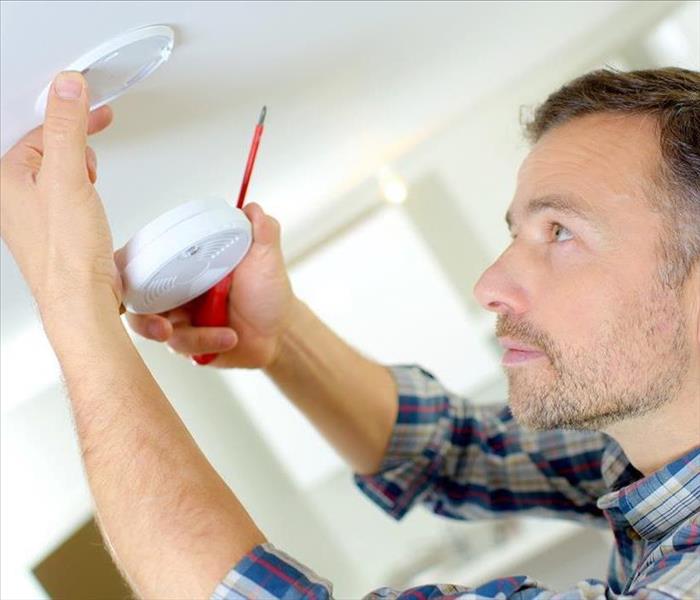 SERVPRO of Douglasville is ready to help you create your emergency plan.
SERVPRO of Douglasville is ready to help you create your emergency plan.
If you are hoping to improve your household fire safety, it can be overwhelming to know where to start. House fires are certainly dangerous, but given the multitude of ways they can start, understanding what fire prevention measures to take around the home can seem like it will be a daunting task.
Fortunately, fire safety is actually quite simple! By adding certain habits into your household routines, you can make major strides in reducing your likelihood of a fire and keeping your family safer.
Read on to learn more regarding where to start when improving fire safety in the home.
How to Begin Your Fire Safety Efforts at Home
**Start with your smoke alarms.** If you are new to fire safety efforts, starting with smoke alarms is really the best thing that you can do. Most people will have less than three minutes to escape when a fire begins in the home, but smoke alarms can ensure all members of your household are alerted quickly so they can begin evacuating. Make sure you have smoke alarms installed throughout each level of the home and in every sleeping area, and test them once per month to be sure they are operational and do not need a battery replacement.
**Create an escape plan.** As previously mentioned, being able to escape quickly is so important in the event of a house fire. It is wise to draft a fire escape plan for your home, and practice it with each member of your household at least every six months. Be sure that you are able to execute your plan in around two minutes, and that everyone knows where to meet up once they are safely outside.
**Consider your cooking habits.** Cooking is one of the most common causes of house fires, so evaluating your cooking habits can be a great way to prevent fires from starting. Be careful about flammable objects near the stove and leaving food unattended while cooking. Additionally, make sure that you have a fire extinguisher in the kitchen that is rated to handle cooking and grease-related fires.
*If you have damage to your home from a house fire, we are the team to call. We are here 24/7 to provide you with a rapid response. Get in touch today to learn more.*
Breaking Down the Fire Tetrahedron
2/2/2022 (Permalink)
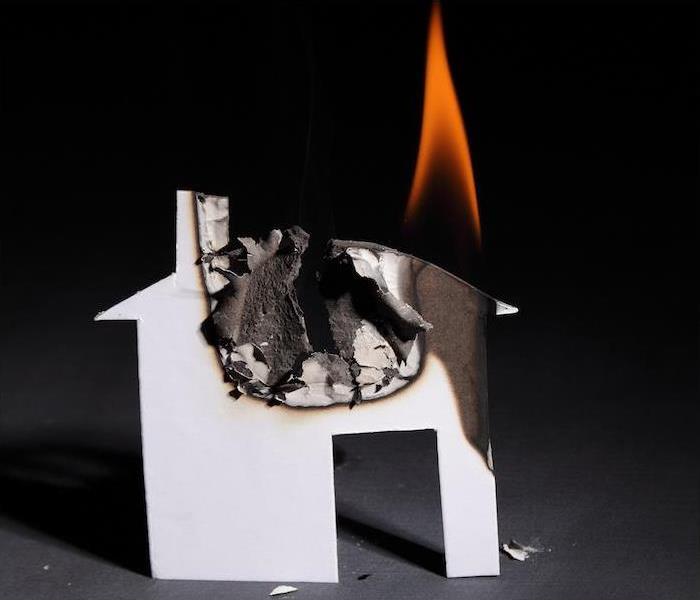 If your home or business has any damage, SERVPRO of Douglasville is ready around the clock to help you recover.
If your home or business has any damage, SERVPRO of Douglasville is ready around the clock to help you recover.
First things first, do you know the definition of a tetrahedron? To cut down on time, let us explain…it’s a three-dimensional, triangular shape with four equal sides.
Now that you know the basics of the geometric shape, let’s discuss what a fire tetrahedron is.
Basically, it’s a way of acknowledging that there are four components needed for fire to start—or four “sides” to the equation. If one of the sides is removed, the structure can’t stand and the fire can’t start.
The 4 Things a Fire Needs to LiveFuel. Fire, like people, needs fuel to keep going. It can be organic or inorganic, but there has to be some source of fuel for a fire to start, such as wood or plastic.
Heat. The amount of heat needed to start a fire varies from substance to substance. But you must have enough heat to cause combustion. Every object has a set point at which it will combust, melting or igniting.
Oxygen. Fire reacts with oxygen to produce a series of chemical reactions. In short, oxygen feeds the fire so that it can keep growing and generates products of combustion in the process.
Chemical Chain Reaction. The cycle of heat, fuel and oxygen combine to produce a chain reaction. This will perpetuate a fire as long as the chain reaction is undisturbed.
The 4 Ways to Stop a FireCool it. This is the most common method for extinguishing a fire, and the most common form of cooling is the application of water. Eventually, when dousing the flames with water, they reach a temperature below what’s needed to sustain a fire.
Smother it. If a fire doesn’t have access to oxygen, then it can’t live. To smother it, you must deprive it of oxygen. This can be a simple task like snuffing a candle, or it can be a little more difficult because it might need chemicals introduced.
Starve it. When a fire burns with no outside interference, it will likely burn until it runs out of adequate fuel. To be proactive, you should remove the fuel source while the fire is still trying to consume it.
Interrupt the chain reaction. Chemical agents can effectively disrupt a chain reaction and put a fire out. One chemical agent that is very effective is halon, but it has an elevated potential for ozone depletion, making it an environmental threat.
If the fire tetrahedron makes a wreck of your home or business, we’re ready around the clock to help you recover. Contact SERVPRO anytime for fast, thorough cleanup and recovery after a fire.
A Fire Safety Checklist for Your Household
1/31/2022 (Permalink)
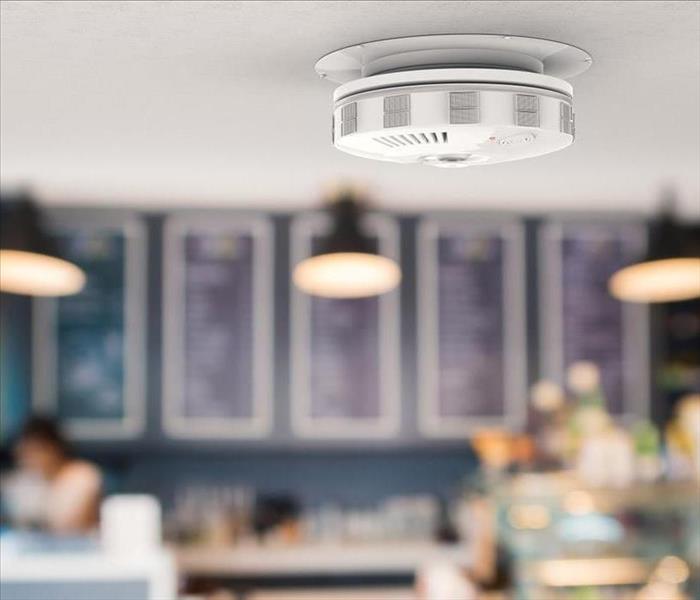 A Fire Safety Checklist can make all the difference in case of an emergency. Let SERVPRO of Douglasville help you get prepared.
A Fire Safety Checklist can make all the difference in case of an emergency. Let SERVPRO of Douglasville help you get prepared.
It is important for any household to practice fire safety as a regular part of their routine. House fires can be both devastating and dangerous, and on average, those in the household will have less than three minutes to escape should a fire begin.
Fortunately, by being vigilant about the prevention of house fires, you can reduce the likelihood of you ever having to experience one. While there is no way to completely eradicate your risk, there are plenty of steps you can take to make your home less susceptible to accidental fires breaking out.
A Checklist for Household Fire Safety
Practicing fire safety is a great way to reduce your risk of experiencing a fire at your home. By referencing this simple checklist, you can be sure you are taking necessary precautions to keep your household safe.
**Smoke Alarms**
* Ensure that you have smoke alarms on each level of the home and in every sleeping area.
* Test smoke alarms each month and replace batteries as needed.
* Note the install date for all alarms and replace after 10 years, even if they are still operational.
**Cooking Safety**
* Be sure to never leave the stove or oven on unattended.
* Keep flammable items, such as towels and wooden utensils, three feet from the stove.
* Store a fire extinguisher prominently in the kitchen.
* Understand the difference between grease fires and other types of fires, and know the methods for extinguishing each.
**General Safety**
* Be sure your household has a fire escape plan that you practice at least twice per year.
* Ensure that every area of your home has at least two exits.
* Store any flammable chemicals in accordance with their label recommendations.
* Keep matches, lighters and other flammable objects away from young children.
* Do not leave candles lit if they are unattended. * Keep anything flammable at least three feet away from candles, space heaters or other sources of heat.
**Electrical Safety**
* Never overload electrical outlets or extension cords.
* Replace any frayed cords or wires immediately.
* Plug appliances and any heat-generating items directly into the wall, not into extension cords.
* If wall outlets ever feel warm to the touch, stop using them immediately and call an electrician.
*If you have damage from a fire, you can count on us to help. We are here 24/7 for restoration—contact us today to learn more about our processes.*
Why You Should Trust SERVPRO With Your Fire Damage Recovery
12/20/2021 (Permalink)
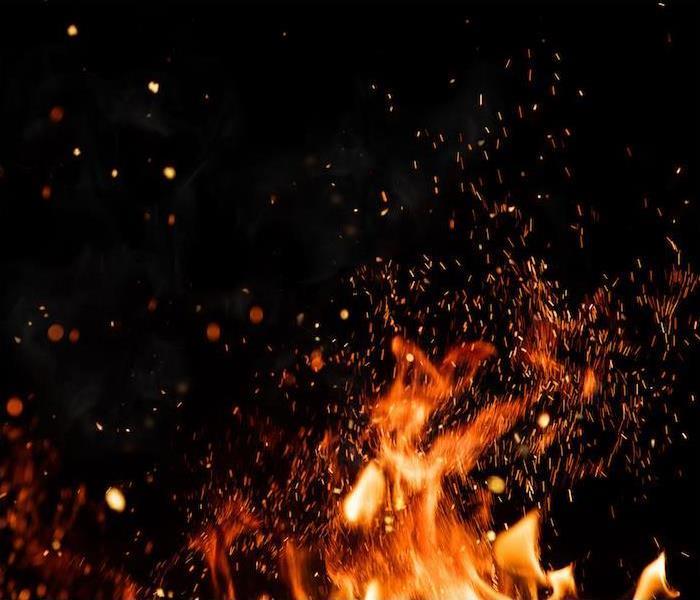 SERVPRO of Douglasville is your local fire restoration expert. No job is too big for our team of experts.
SERVPRO of Douglasville is your local fire restoration expert. No job is too big for our team of experts.
Dealing with a fire is one of the most taxing things a homeowner could possibly imagine.
Fire causes all kinds of damage in your home, and recovering from a home fire encompasses dealing with physical, financial, emotional and mental recovery.
While SERVPRO can’t help with all these areas, we can be your main source of property recovery and restoration. And we can get your home taken care of quickly, which can in turn aid in your emotional recovery as well.
Here’s why you know you can feel good about entrusting your fire recovery to us.
We’re Established.
We’ve been doing this a very long time. SERVPRO was established the same year Thurgood Marshall was appointed to the Supreme Court, if that gives you any idea.
That means we’ve got over 50 years’ experience helping families and homeowners deal with the effects of fire, and we’ll use all those years of innovation and experience to give you the most complete recovery possible.
We’re Skilled.
Your local SERVPRO employs a team of experts, trained and equipped to handle anything fire may have done to your home. From reversing the effects of smoke damage to full-blown rebuilding efforts, we have the tools and work ethic to get it done.
We’re always up to date on the latest technologies, innovations and certifications, which multiplies our capacity for tackling even the toughest recovery projects.
We’re Very Fast.
When you click this link or call (770) 483-1212, you’re getting connected with a local team who can be onsite right away to get started.
You don’t have to wait for a team from somewhere else to mosey down to Conyers—no, we’re right here on Culpepper Drive, which means when you need us, we’re the quickest option for your recovery. And we’re on call 24 hours a day, seven days a week to take your emergency call.
When fire strikes at home, the choice is clear: SERVPRO is the name you can trust with your recovery and restoration.
If fire or other disasters do damage to your home, we’re here to make things right again. Contact us today to get fast, local recovery started on your property right away.
8 Things to Do After a House Fire
10/6/2021 (Permalink)
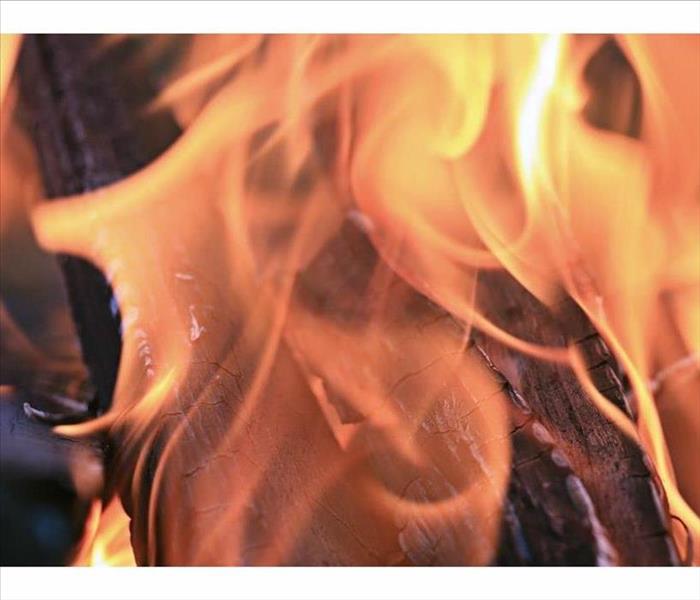 When facing a fire at your home, trust SERVPRO of Douglasville to help you make it "Like it never even happened."
When facing a fire at your home, trust SERVPRO of Douglasville to help you make it "Like it never even happened."
8 Things to Do After a House Fire
Moving on after a house fire can seem daunting—in fact, sometimes it can feel downright impossible. But it doesn’t have to. Knowing where to begin and who can help you is a crucial first step in putting your life back together.
If you’ve just suffered a house fire, follow these eight steps to help you and your family through this difficult time.
Find a Place to Stay
House fires are a terrifying experience, especially for children and pets. Finding a safe and comfortable place to relocate—even if it’s only for one night—will help you plan your next steps and give your family time to rest.
If staying at a hotel or with friends or family isn’t available, reach out to your local disaster relief agency like the American Red Cross or Salvation Army. Many times, these organizations can provide temporary shelter for free.
Contact Your Insurance Agent
File your claim immediately. The sooner you alert your insurance carrier, the sooner you can begin repairs or searching for a new home. Many carriers also provide help for daily expenses known as loss of use funds. These are especially useful if you lost your credit or debit cards in the fire.
Your agent can also help you find cleaning or abatement services.
Contact the Police
Empty homes—even those with fire damage—can be attractive locations for squatters and looters. Alerting local police to your fire will ensure your property remains safe during your absence. Boarding up windows and doors will provide an additional layer of security. You can tackle this job yourself or hire a pro.
The cost to board your windows will range from between $20 and $100 per window. Prices will vary based on the number and size of windows, and whether you hire a pro or not. Be sure to check with your fire department to ensure the home is safe to enter before beginning this job.
Plan Your Finances
Financial responsibilities will continue regardless of your fire. Many insurance policies cover mortgages, but it’s important to check on other recurring costs like car payments as well. Additionally, consider canceling cable and internet services if you won’t be in your home for several months. If you’re planning to front the costs of abatement, you can expect to pay between $800 and $25,300+.
It’s common to lose possessions like cooking equipment and clothing in the fire, too. Keep your receipts when replacing these items to ensure you’re quickly reimbursed. These can be pricey purchases if made at once for several family members.
Create a List of Damaged Items
Making a list of items—both big and small—that were lost or damaged in the fire will ensure you’re reimbursed. Many carriers will require detailed information like make and model, serial numbers, and receipts. This can be difficult if your home was completely destroyed, or you don’t yet have access to it. If you have a computer, searching online bank statements can help you present proof of purchase and exact costs.
It’s also critical to make a list of important documents that were lost in the fire. Items like drivers’ licenses, birth certificates, passports, titles and deeds, medical records, tax information, etc., will need to be replaced immediately. Your agent will let you know which items are necessary for your claim. Replace those first.
Check on the Safety of Your Home
House fires can weaken the structural integrity of your home and leave behind noxious fumes from burned materials. If you need to return home to recover items, wait until a fire marshal has deemed the area safe. Aside from being dangerous, re-entering your home too soon can also void parts of your insurance policy—which can cause major problems when it comes to getting reimbursed later. Only enter your home once it’s deemed safe by the fire department and your insurance carrier.
Save Undamaged Possessions
If your home was partially damaged and deemed safe to re-enter, go back and remove anything that wasn’t affected by the fire. It’s also recommended to clean items after they’re removed from the house. Professional cleaning services have the experience and tools necessary to restore fire-affected items.
Many homeowners rent a storage unit to house salvageable items. Leaving possessions in your home can cause further damage and make it difficult for your abatement and repair crews to work. Most homeowners pay between $40 and $225 a month for storage units. Size and extras like climate control will affect pricing.
Wait to Turn on Utilities
In some cases, firefighters will turn off utilities to prevent further damage. If your utilities are disconnected, contact your fire department and utility provider before turning them on again. Connecting unsafe utilities can cause additional fires, gas leaks, and severe water damage. Have a professional inspect your home before attempting to turn on your utilities.
Carbon Monoxide: A Silent Cold-Weather Killer
9/20/2021 (Permalink)
Carbon monoxide is a gas you cannot see, taste, or smell. According to ready.gov, an average of 430 Americans die each year from unintentional carbon monoxide poisoning. Oftentimes, it is a result of faulty, improperly used, or vented consumer products like furnaces, ranges, water heaters, room heaters, and engine-powered equipment, such as portable generators.
However, there are precautions you can take to help protect yourself, your family, and your employees from deadly carbon monoxide fumes.
Reduce the chance of carbon monoxide exposure in your workplace by performing regular maintenance on equipment and appliances that can produce carbon monoxide. Install carbon monoxide detectors on every level of the home, including outside of all bedrooms.
Consider having all fuel-burning heating equipment and chimneys serviced annually by a professional. Use portable generators on in well-ventilated areas aware from doors, windows, vents, and any other openings to prevent fumes from entering the home.
For additional carbon monoxide safety information, visit usfa.fema.gov or osha.gov.
How Grill Fires Get Out of Hand
8/30/2021 (Permalink)
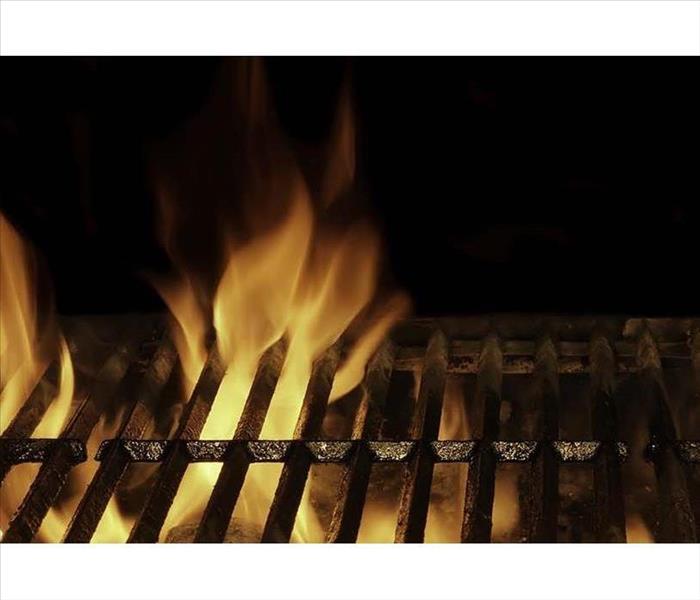 If your home has been damaged due to a fire, you can count on SERVPRO of Douglasville to help you out with our proven fire restoration techniques.
If your home has been damaged due to a fire, you can count on SERVPRO of Douglasville to help you out with our proven fire restoration techniques.
If you love to grill as much as we do, hearing about a grill fire taking place can be quite alarming. There are many reasons why grill fires can start, and they are far more common than people typically realize—the U.S. Fire Administration has found nearly 6,000 grill fires occur each year, with the most instances occurring during the summer.
While grill fires can happen to anyone, regardless of how careful they are being, taking the proper precautions can significantly reduce the chances that they will occur at your next cookout. Below, we examine the science of how these fires spread so you can consider how to best prevent them when you grill.
How Grill Fires Spread and Cause Damage
A grease fire starts due to improper cleaning. Cleaning your grill is one of the most important parts of grill owner maintenance, both because it helps your food cook better and reduces the chances that you will have a fire. If your grill grates and grease traps are not cleaned, a grease fire can start and quickly envelop your grill. You should always grill with a fire extinguisher nearby just in case, but cleaning your grill is the best step to prevention.
A flare-up ignites an object too close to the grill. Flare-ups are a normal part of grilling and they are typically not severe. Unfortunately, if you have your grill too close to a flammable object, a small flare-up can cause a disastrous fire. It is recommended you keep at least three feet around your grill empty of all flammable materials—this includes porches, siding and plants, as well as children or pets that could get injured.
An accident happened with an unattended grill. Fires can start and spread with a moment’s notice, and if your grill is unattended when one happens, you may not notice it until it has become too late. Never leaving your grill unattended is the best choice—even if you are just taking a quick break, always have someone take your place and watch it.
If your home has been damaged due to a fire, you can count on us to help you out with our proven fire restoration techniques. Learn more today and get in touch at any time of day to receive a quick response from our experienced team.
Training Your Employees on Fire Safety in the Workplace
7/21/2021 (Permalink)
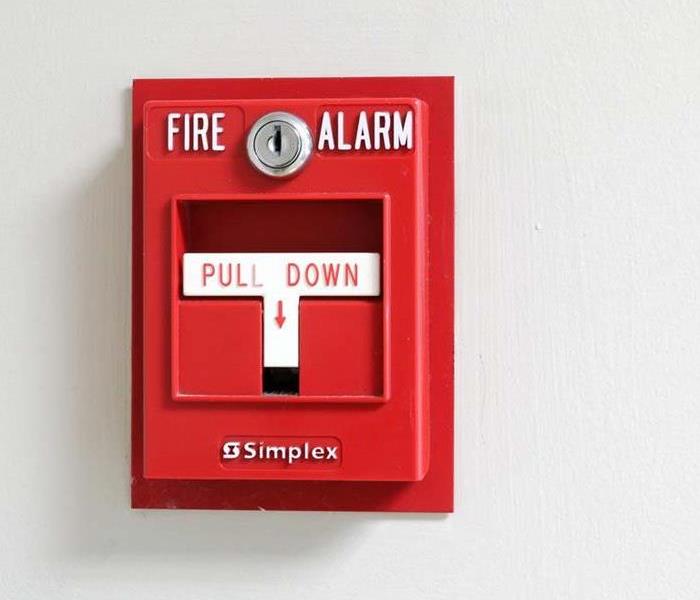 If you have fire damage to your business, you can depend on SERVPRO of Douglasville.
If you have fire damage to your business, you can depend on SERVPRO of Douglasville.
Owning a business presents a large liability for multiple reasons. While you have many things you must plan for, planning for an emergency event such as a fire should certainly be part of your routine. Every year, fires lead to around $10 billion in overall damages, and if your business is not prepared before one happens, these damages can devastate you.
One of the best ways to boost the overall fire safety of your workplace is by training your employees to be conscious about it. When they are empowered to practice fire safety themselves, you can significantly lower your risk and ensure everyone is working together to create a safer office space.
Tips to Empower Your Employees to Be Fire-Safe
Create a fire safety committee. Installing a properly equipped fire safety committee in your office is a great way to tackle fire safety problems and allow you to delegate some of the planning so it does not all fall on you. A fire safety committee can plan evacuation drills, suggest improvements around the office and communicate other fire safety efforts with the staff at large so everyone is in the loop.
Make sure everyone knows the fire protocol. Fire alarms can incite panic in even the most prepared of individuals, but knowing what to do can significantly reduce the fearful instincts they might inspire. Be sure that you have regular workplace fire evacuation drills in order to help your employees be prepared for a real-world fire scenario. Everyone in your building should feel comfortable navigating emergency exit routes and getting to safety when a fire starts anywhere in the building.
Have a fire extinguisher seminar regularly. Fire extinguishers are an effective way to stop an electrical or other small fire in its tracks before it becomes out of hand—but only if your staff knows how to use them. Make sure to train everyone on their operation (you can often have local fire officials pay a visit to do this), and clearly mark where they are throughout the office so everyone is empowered to take action at the first sight of a spark.
If you have fire damage to your business, you can depend on us. Contact us at any hour to learn about our commercial restoration process.




 24/7 Emergency Service
24/7 Emergency Service














